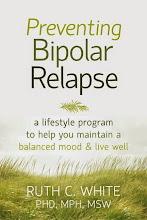This is a repost of an excellent article on depression among men.
Suicide and Silence: Why depressed men are dying for someone to talk to
by Owen Jones, The Guardian, Friday 15 August, 2014
Friday, August 15, 2014
Sunday, July 27, 2014
How Much Exercise is Enough to Fight Depression?
The article below is reposted from PsychologyToday.com and explores the science behind the challenges and benefits of getting the 'right' amount of exercise to get the most from its anti-depressant properties:
Dose Matters: Exercise as Anti-depressant by Dr. Victoria L. Dunckley - a board-certified psychiatrist.
Quotes:
"Interestingly, in a recent study in which patients were assigned to antidepressant medication, exercise, or combined medication plus exercise, the combination treatment did not appear to provide any additional benefit than exercise alone—which was equivalent to the medication effect (sertraline, brand-name Zoloft was used). In fact, when researchers looked at 6-month relapse rates, the exercise-only group did better than the combination group. (only 9% had relapsed compared to 30% in the other two groups.)"
"...based on other research regarding the beneficial of morning bright-light exposure on mood and sleep quality, that an outdoor workout in the morning will augment exercise’s effect even further."
Dose Matters: Exercise as Anti-depressant by Dr. Victoria L. Dunckley - a board-certified psychiatrist.
Quotes:
"Interestingly, in a recent study in which patients were assigned to antidepressant medication, exercise, or combined medication plus exercise, the combination treatment did not appear to provide any additional benefit than exercise alone—which was equivalent to the medication effect (sertraline, brand-name Zoloft was used). In fact, when researchers looked at 6-month relapse rates, the exercise-only group did better than the combination group. (only 9% had relapsed compared to 30% in the other two groups.)"
"...based on other research regarding the beneficial of morning bright-light exposure on mood and sleep quality, that an outdoor workout in the morning will augment exercise’s effect even further."
Monday, June 23, 2014
Social Support and Bipolar Disorder
The following is an excerpt from the book, Preventing Bipolar Relapse (New Harbinger, 2014)
Several
studies have shown that social support from friends and family is important to
preventing bipolar disorder. Studies seem to be biased towards the impact of
social support on depression, probably because people with mania are less
likely to seek help. The onset of symptoms can be accompanied by social
behaviors such as irritability, anxiety and anger that impact social
relationships and negative social relationships can exacerbate or trigger mood
changes creating a downward spiral. Some studies of the link between social
support and bipolar disorder is discussed below to demonstrate the evidence for
making a case for seeking and maintaining a social support network that will
improve your overall mental health and prevent and reduce the impact of
symptoms of both mania and depression.
A study
of social support and social strain (Eidelman et al, 2012) compared people
living with bipolar disorder and people without a mental illness (control
group) for 28 days using journals. The bipolar disorder group had lower
measures of social support and more social strain that the control group. Manic
and depressive symptoms in the bipolar disorder group were increased the more
social strain they experienced. Social support was also associated with more
stable sleep in people living with bipolar disorder.
Another
study of social support and mood symptoms (Pratchett, 2010) among
high-functioning people living with bipolar disorder showed that lower levels
of perceived social social support was related to more severe symptoms of lower
mood and higher mood, and to persistence of these symptoms 6 months later,
regardless of age, marital status, income or gender.
Unsupportive
social networks have also been found to increase the likelihood of medication
non-adherence (Sajatovic et al., 2011). A study of unipolar and bipolar
disorders found differences in the functioning of social networks between the two
groups but found that stabilizing supportive relationships should be a goal of
psychotherapy because both groups had minimal social networks and relied on one
primary person for all their social support (Poradowska-Trosz, Dudek, Rogoz and
Zieba, 2009).
Self-esteem
has also been shown to be a mediating factor through which social support is
expressed. This means that
people with higher self-esteem are more likely to seek out social support and
to have more friends. It also means that people with higher self-esteem are
more open to the social support that a strong network of friends provide.
For
adolescents with bipolar disorder it appears that family relationships are
important to onset and continuation of symptoms (Sullivan et al, 2012). Family
conflict, adaptability and lack of cohesion are predictors of adolescent mood
symptoms. The authors suggest that family conflict be a focus of
psychosocial intervention in early onset bipolar disorder.
REFERENCES
Eidelman, Polina, Anda Gershon, Katherine
Kaplan, Eleanor McGlinchey, and Allison G Harvey, "Social support and
social strain in inter-episode bipolar disorder." Bipolar
Disorders 14 (2012): 628-640.
Poradowska-Trzos,
Magdalena, Dominika Dudek, Monika Rogoż, and Andrzej Zięba, "The
comparison of social networks of patients with unipolar and bipolar affective
disorder." Archives Of Psychiatry & Psychotherapy 11
(2009): 43-50.
Pratchett, Laura. "Social support in bipolar disorder: The
relationship between social support and mood symptoms." US: ProQuest Information & Learning,
2010.
Sajatovic, M., M.
Valenstein and F. Blow, “Treatment adherence with antipsychotic medications in
bipolar disorder”, Bipolar Disorders 8 (2006): 232 – 241.
Sullivan, A. E., C. M.
Judd, D. A. Axelson, and D. J. Miklowitz, “Family functioning and the course of
adolescent bipolar disorder”, Behavior
Therapy, 43 (2012): 837-847.
Subscribe to:
Comments (Atom)




